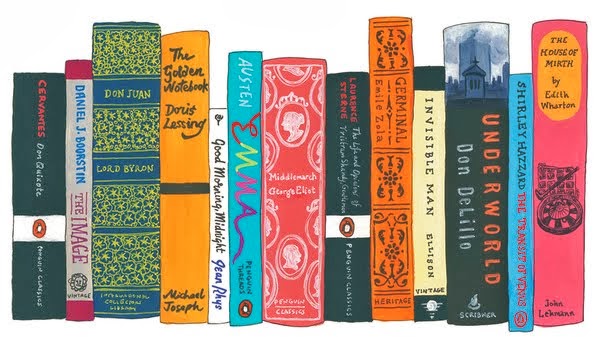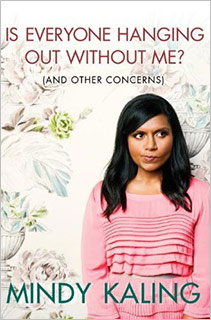“This book will take you two days to read. Did you even see the cover? It’s mostly pink. If you’re reading this book every night for months, something is not right.”
Ok, full disclosure: This book took me three days to read when it should’ve taken me an afternoon. Why? Not because I’m secretly dyslexic or really super slow, but simply because I did not not not want this book to end. I didn’t think it’d be possible to read a book that I thought was funnier than “Bossypants,” but this one took the cake (mmm, cake).
“Is Everyone Hanging Out Without Me” is written by someone who, up until reading the book, I knew nothing about, cared nothing about, and really thought was sort of annoying. I’m not a fan of the US version of “The Office”, even though I think it has its moments. But I really wasn’t a fan of Mindy Kaling’s character on that show. So when I heard that she wrote a book, it barely registered.
But then it popped up on my Amazon list under “Suggested Reads” (not sure why, I mean, just because I read any book by any famous woman who wants to give me advice on life, love, and friendship doesn’t mean…hey, it does sound funny! Thanks, Amazon.com!). However, I was still resistant because I have standards and if I’m going to be in my apartment alone reading with my cat it has to be something worthwhile, like Betty White’s “If You Ask Me…and I’m Sure You Won’t” (classic!).
In a shocking turn of events, though, I got really desperate one night when I realized that I was going through withdrawal after finishing the Steve Jobs biography (stay tuned) and “The Gates” (thanks for blogging about that, dad! Loved it! Perhaps I’ll add to your blogging…). So, I wandered over to Barnes and Noble and this pretty pink book was staring me down, just daring me to buy it. Never one to say no to a challenge, I picked it up and said “Bring it, Mindy.”
And she did.
I think Amanda would really like this book (actually, I think you all would, but for some reason I can’t see mom or dad picking it up) and I promise you will laugh out loud at almost every page. And the moment I put it down I immediately texted Courtney, Mary, Beth, and Deidre to tell them to stop whatever it was that they were doing and buy it. And since Courtney and Mary are the only ones, for some reason, who listen to what I say (mind-boggling), they did it immediately, leading to one of the greatest compliments I’ve ever received.
Court: I’m pretty sure you are the ghost writer behind this book. She sounds just like you. You need to write a book.
Me: I wish I was that funny.
Court: You are. Now shut up and go write a book.
So, you see, with a review like that how could you not want to read it?
“I'm the kind of person who would rather get my hopes up really high and watch them get dashed to pieces than wisely keep my expectations at bay and hope they are exceeded. This quality has made me a needy and theatrical friend, but has given me a spectacularly dramatic emotional life.”
 Near the beginning of the book, one of the characters describes historical questions by noting "we need to know the history of the historian in order to understand the version that is being put in front of us." This is Adrian Finn, the bright one of a group of four English school boys with the one putting history in front of us being Tony Webster. The story moves quickly (163 pages in the paperback version) through Tony's life and yet we don't start to understand it until the last page. Then you want to go back to some spots to see if the story still hangs together, which of course it does. Tony is an inaccurate teller of history, not because he is dishonest but just because he is human. His own history is colored by his emotions and so he doesn't fully know the history of the historian. Things that he was certain of at 25 look different at 60. Isn't that always the case?
Near the beginning of the book, one of the characters describes historical questions by noting "we need to know the history of the historian in order to understand the version that is being put in front of us." This is Adrian Finn, the bright one of a group of four English school boys with the one putting history in front of us being Tony Webster. The story moves quickly (163 pages in the paperback version) through Tony's life and yet we don't start to understand it until the last page. Then you want to go back to some spots to see if the story still hangs together, which of course it does. Tony is an inaccurate teller of history, not because he is dishonest but just because he is human. His own history is colored by his emotions and so he doesn't fully know the history of the historian. Things that he was certain of at 25 look different at 60. Isn't that always the case?










